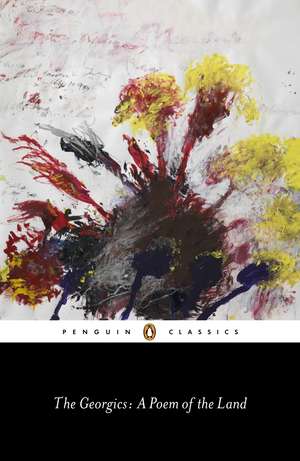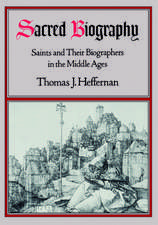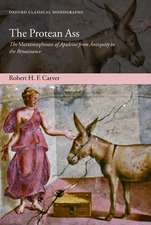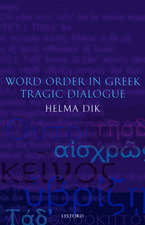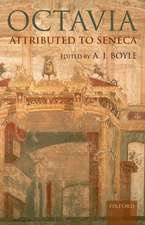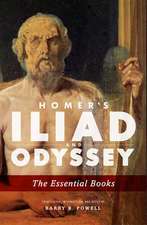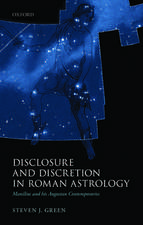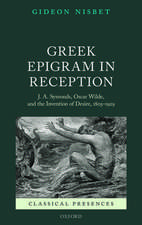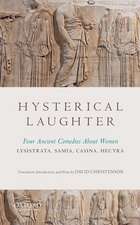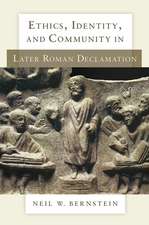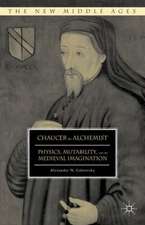The Georgics: A Poem of the Land
Autor Virgil Traducere de Kimberly Johnsonen Limba Engleză Paperback – 24 noi 2010
'Georgic' means 'to work the earth', and this poetic guide to country living combines practical wisdom on tending the land with exuberant fantasy and eulogies to the rhythms of nature. It describes hills strewn with wild berries in 'vine-spread autumn'; recommends watching the stars to determine the right time to plant seeds; and gives guidance on making wine and keeping bees. Yet theGeorgicsalso tells of angry gods, bloody battles and a natural world fraught with danger from storms, pests and plagues. Expansive in its scope, lush in its language, this extraordinary work is at once a reflection on the cycles of life, death and rebirth, an argument for the nobility of labour and an impassioned reflection on the Roman Empire of Virgil's times. Kimberly Johnson's lyrical verse translation captures all the rich beauty and abundant imagery of the original, re-creating this ancient masterpiece for our times.
| Toate formatele și edițiile | Preț | Express |
|---|---|---|
| Paperback (15) | 32.73 lei 3-5 săpt. | |
| Mint Editions – apr 2021 | 32.73 lei 3-5 săpt. | |
| CREATESPACE – | 46.41 lei 3-5 săpt. | |
| CreateSpace Independent Publishing Platform – | 49.07 lei 3-5 săpt. | |
| CreateSpace Independent Publishing Platform – | 50.44 lei 3-5 săpt. | |
| OUP OXFORD – 26 feb 2009 | 51.19 lei 10-16 zile | +15.76 lei 5-11 zile |
| Penguin Books – 24 noi 2010 | 79.20 lei 3-5 săpt. | +9.43 lei 5-11 zile |
| Penguin Books – 24 noi 1982 | 80.72 lei 3-5 săpt. | +5.08 lei 5-11 zile |
| CREATESPACE – | 93.30 lei 3-5 săpt. | |
| Hackett Publishing Company, In – 14 mar 2002 | 93.58 lei 3-5 săpt. | |
| CreateSpace Independent Publishing Platform – | 62.08 lei 6-8 săpt. | |
| Book Jungle – 17 apr 2008 | 90.24 lei 6-8 săpt. | |
| Devoted Publishing – 28 noi 2016 | 98.16 lei 6-8 săpt. | |
| TREDITION CLASSICS – 31 oct 2011 | 109.33 lei 6-8 săpt. | |
| Blurb – 10 feb 2019 | 119.53 lei 38-44 zile | |
| Clarendon Press – 21 apr 1994 | 253.59 lei 31-37 zile | +103.44 lei 5-11 zile |
| Hardback (1) | 263.30 lei 3-5 săpt. | |
| Hackett Publishing Company – 15 mar 2002 | 263.30 lei 3-5 săpt. |
Preț: 79.20 lei
Nou
Puncte Express: 119
Preț estimativ în valută:
15.16€ • 15.73$ • 12.67£
15.16€ • 15.73$ • 12.67£
Carte disponibilă
Livrare economică 24 februarie-10 martie
Livrare express 08-14 februarie pentru 19.42 lei
Preluare comenzi: 021 569.72.76
Specificații
ISBN-13: 9780140455632
ISBN-10: 0140455639
Pagini: 224
Dimensiuni: 129 x 198 x 13 mm
Greutate: 0.18 kg
Editura: Penguin Books
Colecția Penguin Classics
Locul publicării:London, United Kingdom
ISBN-10: 0140455639
Pagini: 224
Dimensiuni: 129 x 198 x 13 mm
Greutate: 0.18 kg
Editura: Penguin Books
Colecția Penguin Classics
Locul publicării:London, United Kingdom
Notă biografică
Publius Vergilius Maro (70-19 B.C.), known asVirgil, was born near Mantua in the last days of the Roman Republic. In his comparatively short life he became the supreme poet of his age, whoseAeneidgave the Romans a great national epic equal to the Greeks’, celebrating their city’s origins and the creation of their empire. Virgil is also credited with authoring two other major works of Latin literature, theEcloguesand theGeorgics.
Kimberly Johnson is a poet and a scholar of Renaissance literature. She is the author of two collections of poetry and the recipient of a National Endowment for the Arts Creative Writing Fellowship. Her poems, essays and translations have appeared in numerous publications, including The New Yorker.
Cy Twombly is a well-known American artist, whose paintings are both graffiti-like and beautifully subtle. He lives in Lexington, Virginia, and Italy.
Kimberly Johnson is a poet and a scholar of Renaissance literature. She is the author of two collections of poetry and the recipient of a National Endowment for the Arts Creative Writing Fellowship. Her poems, essays and translations have appeared in numerous publications, including The New Yorker.
Cy Twombly is a well-known American artist, whose paintings are both graffiti-like and beautifully subtle. He lives in Lexington, Virginia, and Italy.
Descriere
Descriere de la o altă ediție sau format:
'A countryman cleaves earth with his crooked plough. Such is the labourof his life. So he sustains his native land ...'Virgil's affectionate poem of the land does not admit brief excerpts, any more than the labour of the farmer can easily be shortened. His verse, descriptive and narrative, brings us the disappointments as well as the rewards of the countryman's year-round devotion to his crops, his vines and olives, livestock great and small, and the complex society of bees. Part agricultural manual, part political poem and allegory, the Georgics' scenes are real and vivid, and the poet-farmer Peter Fallon makes us feel the sights, sounds, and textures of the ancient Italian landscape.'the combination of truth to the words Virgil wrote, natural vernacular speech and a general at-homeness on the land make Fallon's an inspired translation' Seamus Heaney, Irish Times'magnificent new translation...Fallon is the perfect translator for the Georgics' Bernard O'Donoghue, Times Literary Supplement ABOUT THE SERIES: For over 100 years Oxford World's Classics has made available the widest range of literature from around the globe. Each affordable volume reflects Oxford's commitment to scholarship, providing the most accurate text plus a wealth of other valuable features, including expert introductions by leading authorities, helpful notes to clarify the text, up-to-date bibliographies for further study, and much more.
'A countryman cleaves earth with his crooked plough. Such is the labourof his life. So he sustains his native land ...'Virgil's affectionate poem of the land does not admit brief excerpts, any more than the labour of the farmer can easily be shortened. His verse, descriptive and narrative, brings us the disappointments as well as the rewards of the countryman's year-round devotion to his crops, his vines and olives, livestock great and small, and the complex society of bees. Part agricultural manual, part political poem and allegory, the Georgics' scenes are real and vivid, and the poet-farmer Peter Fallon makes us feel the sights, sounds, and textures of the ancient Italian landscape.'the combination of truth to the words Virgil wrote, natural vernacular speech and a general at-homeness on the land make Fallon's an inspired translation' Seamus Heaney, Irish Times'magnificent new translation...Fallon is the perfect translator for the Georgics' Bernard O'Donoghue, Times Literary Supplement ABOUT THE SERIES: For over 100 years Oxford World's Classics has made available the widest range of literature from around the globe. Each affordable volume reflects Oxford's commitment to scholarship, providing the most accurate text plus a wealth of other valuable features, including expert introductions by leading authorities, helpful notes to clarify the text, up-to-date bibliographies for further study, and much more.
Recenzii
Chew's translation is, both in aesthetic and scholarly terms, an excellent piece of work. I find her approach refreshing and true to the spirit of the Georgics ; her adventurousness strikes me as just the thing to rescue the poem from the appearance of blandness that a more straightforward style of translationese would inevitably, but misleadingly, impose upon it. This Georgics does not read much like any previous version of it. Chew helps the English reader to get a sense of Virgil's avant-garde poetics, which is the main thing that almost all translators of the Georgics work to eliminate, if indeed they are even aware of it. First-rate. --Joseph Farrell, Professor of Classical Studies, University of Pennsylvania
This is a translation with a difference, intended for readers without Latin. The most striking feature is the use of variations of type and layout. . . . Invocations are set out like memorial inscriptions; tasks or points to look for in animals come in the form of numbered or bulleted lists, assembling a plough reads like an instruction manual. Similes appear in italics, but so do the key words in some descriptive passages. The positioning of the text is used to illustrate the meaning of a quincunx, terracing, or the flight of a swarm of bees. These innovations serve to distinguish between what might be termed the poetry and the practical. Explanations are sometimes incorporated into the translation, which is in free verse, but mostly these are in the generous footnotes. . . . Chew has done considerable research into ancient and modern methods of husbandry and the notes concentrate on agriculture, astronomy, and botany. . . . Some [renderings] are particularly apt: 'the cicadas' complaining plainsong bursts the strawberry trees' for 'cantu querulae rumpent arbusta cicadae;' 'the murmur of the groves grows and grows' for 'et nemorum increbescere murmur.' . . . Chew should certainly achieve her aim of bringing the work to a wider readership. As she claims in her Introduction, 'Plain and simple, it is an American Georgics .' _--Anne Haward, The Joint Association of Classical Teachers Review
My graduate seminar members and I enjoyed Dr. Chew's rendering of the Georgics immensely. We were delighted and instructed by her playful blend of argots and typefaces, and by her artful blend of information in the notes. This translation opened the poem for me all over again--and it has long been among my favorites. Chew's translation offers a dazzling survey of musical styles in the poem. The fifteen of us send our thanks for her provocative and delightful achievement. ---Thomas A. Goodmann, University of Miami
This is a translation with a difference, intended for readers without Latin. The most striking feature is the use of variations of type and layout. . . . Invocations are set out like memorial inscriptions; tasks or points to look for in animals come in the form of numbered or bulleted lists, assembling a plough reads like an instruction manual. Similes appear in italics, but so do the key words in some descriptive passages. The positioning of the text is used to illustrate the meaning of a quincunx, terracing, or the flight of a swarm of bees. These innovations serve to distinguish between what might be termed the poetry and the practical. Explanations are sometimes incorporated into the translation, which is in free verse, but mostly these are in the generous footnotes. . . . Chew has done considerable research into ancient and modern methods of husbandry and the notes concentrate on agriculture, astronomy, and botany. . . . Some [renderings] are particularly apt: 'the cicadas' complaining plainsong bursts the strawberry trees' for 'cantu querulae rumpent arbusta cicadae;' 'the murmur of the groves grows and grows' for 'et nemorum increbescere murmur.' . . . Chew should certainly achieve her aim of bringing the work to a wider readership. As she claims in her Introduction, 'Plain and simple, it is an American Georgics .' _--Anne Haward, The Joint Association of Classical Teachers Review
My graduate seminar members and I enjoyed Dr. Chew's rendering of the Georgics immensely. We were delighted and instructed by her playful blend of argots and typefaces, and by her artful blend of information in the notes. This translation opened the poem for me all over again--and it has long been among my favorites. Chew's translation offers a dazzling survey of musical styles in the poem. The fifteen of us send our thanks for her provocative and delightful achievement. ---Thomas A. Goodmann, University of Miami
